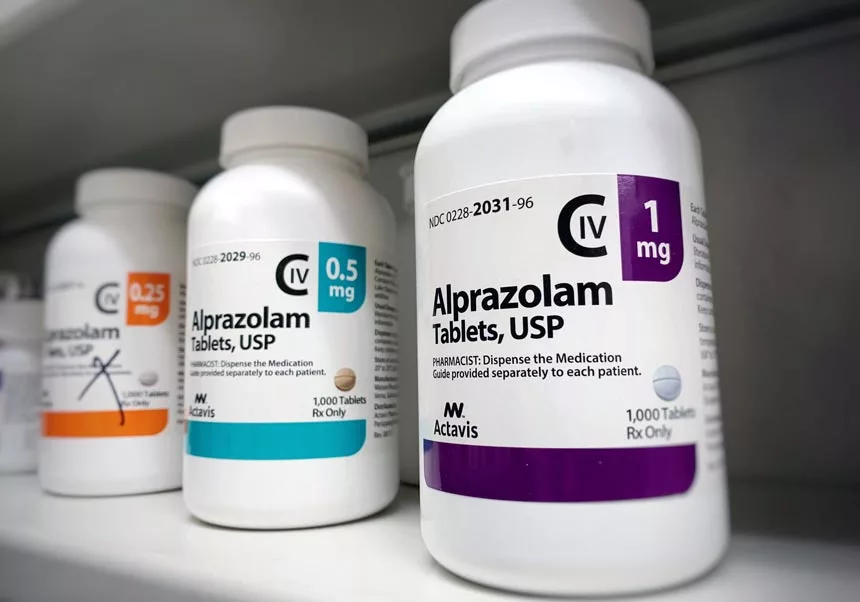What Are Benzodiazepines?
Table of Contents
Commonly referred to as “benzos”, benzodiazepines are tranquilizers primarily used for the treatment of anxiety disorders, accounting for 56 percent of all benzodiazepine prescriptions. They are also used to treat insomnia and seizure disorders.
Benzodiazepines are also given to people before surgery to calm or sedate them so they can undergo a medical procedure. Although you should only take benzodiazepines if they have been prescribed by a doctor, many people abuse them illegally by purchasing them on the street or taking pills from other people.
This is considered prescription drug abuse and often leads unaware individuals to dependence. Taking prescriptions without a medical necessity or proper prescription can be dangerous for an individual. Abuse also takes form as a result of taking more benzodiazepines than prescribed.
Keep reading to find out more details about benzodiazepine dependence and effective forms of treatment!
The Various Types of Benzodiazepines

There are many different varieties of benzodiazepines which each hold subtle or major differences. As every individual’s body works differently, it is likely that some medications do not work well for them while others do.
This variety provides that coverage and allows individuals to receive proper medication. Here is a complete list of the different types of benzodiazepines which include the commonly prescribed medications:
- Riazolam (Halcion)
- Midazolam (Versed)
- Clorazepate (Tranxene)
- Alprazolam (Xanax)
- Lorazepam (Ativan)
- Temazepam (Restoril)
- Oxazepam (Serax)
- Estazolam (ProSom)
- Diazepam (Valium)
- Chlordiazepoxide (Librium)
- Flurazepam (Dalmane)
- Quazepam (Doral)
- Clonazepam (Rivotril, Klonopin)
Benzodiazepines Side Effects
Like every other medication, benzodiazepines come with side effects. These side effects can Some of the most common include:
- Drowsiness
- Mental Confusion
- Tremors
- Dizziness
- Loss of Coordination
- Depression
- Fatigue
- Physical Dependence
- Cravings For More Benzos
How Does Benzodiazepine Dependence Develop?

Substance abuse is a major issue that leads to further complications within an individual’s health as well as our society as a whole. Benzodiazepine can lead to many harmful situations such as polysubstance abuse or overdose.
Benzos cause the body to slowly become accustomed to the drug which results in benzodiazepine dependence. These drugs work quickly and immediately bring a sense of calmness and tranquility.
For this reason, they are classified as depressants and with the continued use of benzodiazepine, an individual is likely to develop a tolerance to the medication.
An individual’s body will slowly become accustomed to the medication over time and this familiarity can reduce its effects from being as potent as when they were first started.
This building of tolerance causes an individual to require more of the drug to produce the same effect. It is important for an individual to work with their provider when making changes to the dosage.
Taking this matter into an individual’s own hands is one of the ways an individual can become addicted to this medication. Improperly taking in too much of the dosage may lead an individual to require that increased dosage and can lead to abuse of the medication.
Doing this without a doctor’s advice will also lead an individual to not have the proper amount of medication to maintain their self-prescribed dosage. This also increases the risk of drug and alcohol abuse.
With the lack of a proper structure, an individual is more likely to find themselves mixing substances together to create an increased effect from the drug; however, this can quickly lead an individual to addiction, and in worse cases, overdose.
Reducing The Risks Of Benzodiazepine Addiction
Although dependence is likely to come so long as an individual is chronically using benzodiazepine, addiction can be avoided. Before moving forward with how to avoid it, it is important to understand the distinction between addiction and dependence.
Addiction is classified as a relapsing disorder in which an individual cannot properly control their substance use. Dependence can be seen as an individual requiring a substance to maintain proper bodily functions.
Dependence can be seen in addiction however, an individual struggling with dependence has control over their substance use. To avoid becoming addicted, it is best for an individual to work alongside their prescription provider when using benzodiazepines.
Following the prescribed dosage helps to avoid abusing this medication as well as taking in too much. Working with the provider to increase a dosage when in need of a higher dose can also help with avoiding addiction.
Benzodiazepine Withdrawal Symptoms
Withdrawal symptoms are one of the biggest reasons which cause individuals to work with their provider to stop taking a benzodiazepine. It can be immensely uncomfortable and even potentially dangerous to abruptly stop taking this medication after long-term use.
Taking benzos for 3-4 weeks is long enough to cause individuals to experience benzodiazepine discontinuation from abruptly stopping. It is important that you undergo the proper process when trying to abstain from benzos to avoid dangerous and unwanted experiences.
This process typically looks like the tapering method which follows slowly lowering the dosage over time as your body becomes used to working without the medication. Restabilization within the body leads to a more comfortable and manageable withdrawal experience.
According to the National Institute of Health, the withdrawal symptoms of benzodiazepine include:
- Headache
- Heart palpitations
- Sweating
- Tremors
- Muscle pain, stiffness and aches
- Paraesthesia, shooting pains in neck and spine
- Visual disturbances
- Tinnitus
- Seizures, coma, or death (in extreme cases and typically occurring within 1-12 days)
- Faintness and dizziness
- Confusion
- Delusions, paranoia
- Hallucinations (visual, auditory)
- Nausea
- Anorexia
- Diarrhea
- Psychological
- Insomnia
- Anxiety, panic attacks
- Irritability
- Poor memory and concentration
- Sensory hypersensitivity
- Metallic taste
- Distortions of body image
- Feelings of unreality, depersonalization, derealisation
- Depression
Benzodiazepine withdrawals are very uncomfortable, difficult to manage, and can even be life-threatening. The withdrawal period will typically last for 1-2 weeks with the end of the phase being the most intense.
This intense experience can vary for everyone however, it typically appears in individuals struggling with chronic or long-term use of benzodiazepines. To best avoid this unwanted experience, an individual can work with the doctor who provided their prescription and go through a gradual dose reduction.
This allows their body to slowly adjust to working with less of the drug and make a smoother transition off of this drug. This is a common technique that is used for prescription drugs that the body adjusts to or relies upon.
This is due to the physical and psychological dependence that comes from benzodiazepine use. Unfortunately, not everyone struggling with benzodiazepine withdrawal syndrome is prescribed benzodiazepines.
There are many individuals struggling with severe benzodiazepine dependence without a proper prescription. With this type of experience, it is best for an individual to undergo a medical detox and work with medical professionals to safely remove this drug from an individual’s system.
Benzodiazepine Dependence Treatment

To treat benzodiazepine dependence, it is necessary to work with your treatment provider to lower your dosage. Because recovery from benzodiazepine dependence can cause seizures or result in a fatality, benzodiazepine abuse treatment requires the employment of specialized care.
Attempting to quit using benzos on your own can lead to an improper detoxification process that can result in dire consequences with it. To fully recover from benzodiazepine dependence, it is advised in your best interests to undergo a supervised drug detox in the safety and comfort of medical staff.
Here you can be monitored and evaluated while making the necessary adjustments to get your life back. There are two specific kinds of detoxification: medical detox and partial hospitalization programs.
These two options are very supportive of individuals safely processing benzodiazepine through their systems. It also may be beneficial to individuals who have gotten benzos off of the street rather than through a proper treatment provider. This allows them to receive proper and safe care rather than relying on their own judgment with unsafe substances.
Medically Supervised Detox
Medical detox is one of the safest ways for an individual to remove a substance from their body. In medically supervised detox, an individual is required to live on-site at a treatment center to receive care.
This program provides 24-hour medical surveillance and support to help individuals through their rough experiences. The medical staff is able to support individuals struggling with chronic benzodiazepine dependence. Administration of other medications may be available to guide individuals away from benzos.
Partial Hospitalization Programs or PHPs
Partial hospitalization programs are a form of ambulatory detoxification which assist individuals with moderate to mild withdrawals. Individuals experiencing severe withdrawals should undergo a medical detox instead.
PHPs allow individuals to receive treatment during the day and return home at night once they have received treatment. This option is typically available for individuals that have a self-manageable experience and require less assistance.
PHPs also have medically trained staff to provide care and assistance as well as adjust the treatment of individuals as needed.
Effective Treatment for Benzodiazepines: Found Here
If you or a loved one are struggling with benzodiazepine dependence or even benzodiazepine addiction, it can be very difficult to know where to start. Here at Find Addiction Rehabs, we make finding treatment easy.
Whether finding a treatment center in your location or connecting you with recovery tools and resources, our hotline is available 24/7 to make sure you can get the help you need, anytime you need it.
It can be overwhelming to know where to find proper treatment, especially while you or a loved one are struggling through withdrawals. Call us today and we can help find the right treatment for you!

